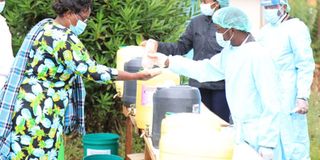Covid doldrums - Worst yet to come as people suffer behind closed doors

Volunteers sanitise worshippers before attending a church service at Tumutumu PCEA Church in Nyeri County on October 25, 2020. This is in line with Ministry of Health protocols to curb the spread of Covid-19.
What you need to know:
- We’re into the second wave of Covid-19.
- We could have a third wave next January and February.
We are in for a very crunchy time which will take us well into next year and even beyond. We’re into the second wave of Covid-19 and depending on how we celebrate and behave over the Christmas holiday period, we could have a third wave next January and February.
The Christmas period is marked by extensive public travelling and family and social gatherings. Most people travel via public transport, which by the sheer nature of the exercise, means a congregation of people even with a modicum of social distancing.
It is natural and normal for people to come together and socialise more during this period. It has been a rough and tumble year for many of us and we are likely to take this opportunity.
Whichever way, we are likely to see a third, but hopefully not alarming, wave. But my biggest worries for the forthcoming year go well beyond the Covid-19 pandemic.
An assortment of infectious diseases are on the rise and the economic fall-out is going to be long and painful.
Let us take a glimpse at the recent World Health Organization (WTO) report entitled The Covid -19 Pandemic and TB-Impact and Implications. TB is the top infectious killer in the world, affecting millions of people. Over 4,000 lives are lost daily.
Reduced services
The report states that, “the Covid-19 pandemic threatens to reverse recent progress in reducing global burden of TB disease. The global number could increase by around 0.2-0.4 million in 2020 if health services are disrupted”.
What is clear is that these already creaking overburdened health services have been further disrupted with outpatient and outreach services being reduced to a bare minimum.
Medical equipment such as Genexpert have been reallocated to Covid-19 testing, reassignment of staff in national TB programmes and reallocation of budgets have all taken place.
Kenya has been no exception to this and hence our mainstream public health services have been massively reduced. We will therefore see a rise in all these infectious diseases that were being attended to or even contained whether they be TB or measles.
Year 2021 will see an upsurge of many of these diseases with morbidity levels that will make deaths from Covid-19 look like small fry.
Our whole medical infrastructure is going to be sorely tested by it and in many cases, will crack under the burden.
It is important to point out one thing. The apparent calm that we appear to see is not indicative of what is happening on the seabed. People have gone to ground. They are wary of going to see a doctor or being treated at their local facility.
They are not only scared, they also know that in many cases, they will not get adequate treatment. There is a lot more sickness at home behind closed doors than we would like to believe.
So we need to be prepared for many challenges on the public health front for the foreseeable future. It goes without saying that this comes hand-in-hand with much more sickness and many more casualties.
The other major casualty is the economy. We have already seen a massive economic and commercial slowdown, job layoffs and an increase in unemployment and poverty levels. The economy of the world, Kenya included, has shrunk.
Sound monetary policy
The government is starting to realise the length and depth of recession and that it is going to be a difficult one to steer through. It’s worth taking a peek back at this and the last government’s economic management record. It is one of two tales.
On the one side it has conducted a responsible and sound monetary policy particularly under the beady eye of CBK Governor Patrick Njoroge.
But conversely, it has run a loose and arguably profligate fiscal policy backed up by borrowing from here, there and everywhere. When the multilateral and bilateral lenders started to tighten the purse strings, it took up a range of soft, but ultimately expensive loans, from the likes of China and often hand-in-hand with projects of dubious value.
Let me clarify something. The SGR project is not necessarily a bad concept or development idea. It is a very, very expensive one vis-à-vis the value it gives and also in our ability to service it.
It has been slow to undertake very necessary structural reforms in a number of areas, including our plethora of performing and non performing parastatals.
The halting of the SGR at Mai Mahiu is symbolic of what has happened to the government and the country. It has had to go back to the IMF with cap in hand and accept some very, very stringent terms for a loan to keep it going.
What goes round comes round and if you thought 2020 was tough, tighten your belt for 2021, and be prepared for a very bumpy ride.





